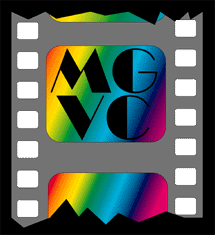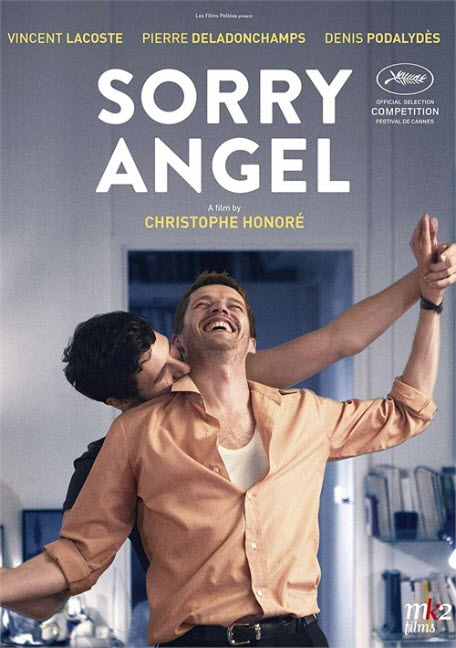(2018, 132 min)
Country: France
Director: Christophe Honore
Studio: Palace Films/Strand Releasing
Language: French w/subtitles
SYNOPSIS: Paris, 1993. Jacques (Pierre Deladonchamps) is a semi-renowned writer and single father in his thirties trying to maintain his sense of romance and humor in spite of the turmoil in his life and the world. While on a work trip to Brittany, he meets Arthur (Vincent Lacoste), an aspiring filmmaker in his early twenties, who is experiencing a sexual awakening and eager to get out of his parochial life. Arthur becomes instantly smitten with the older man.
From writer-director Christophe Honore (Love Songs, Dans Paris) comes a mature and deeply emotional reflection on love and loss, and youth and aging. In its inter-generational snapshot of cruising, courtship, and casual sex - Jacques' forty-something neighbor Mathieu (Denis Podalydes) rounds out the triumvirate - Sorry Angel balances hope for the future with agony over the past in an unforgettable drama about finding the courage to love in the moment.
REVIEW:
In any gay love story set in the 1990s, AIDS is bound to play a part, underpinning the narrative or taking it over completely and usually in a somber or hysteric fashion. In the world of cinema, the disease is much too horrible epic to only appear as a passing detail or a single layer of a world complicated by so many other issues. In writer-director Christophe Honoré's "Sorry Angel", AIDS is everywhere but not as a looming monster looking for its next victim and neither is it the catastrophic result of political negligence and homophobic policy. In this film, AIDS is décor.
Set in 1993 in Paris, we meet Jacques (Pierre Deladonchamps), a successful 39-year-old Parisian author, and Arthur (Vincent Lacoste), a Breton college student. At this time, AIDS has already settled into the everyday lives of queer men as a kind of "inevitable companion". For Jacques, this means sharing his home with his young son, Louis (Tristan Farge), and his dying ex-boyfriend, Marco (Thomas Gonzalez), without much spectacle or commotion.
By acknowledging AIDS as something that all gay men have to reckon with in some capacity, Honoré exposes the ways in which some have turned great tragedies into banalities as suggested by the film's French and original French title "Plaire, Aimer et Courir Vite", to keep on "loving, enjoying, and running fast" and to evade death's premature grasp. We see how exercising a certain hospitality toward inescapable illness may have been an unsustainable strategy in the '90s for some, but it was bound to break even the most positively intentioned bodies, no matter how quickly they ran.
The story that develops between Jacques and Arthur doesn't seem to be driven by romance or sexual chemistry, but by Jacques's professorial need to teach Arthur a thing or two. Much more interesting than their relationship is Honoré's look at the early '90s as not only a time of accelerated mortality and mourning, but also of material encounters of all kinds. These encounters were not just between people, but with material objects and the ultimate reminder that one is, despite everything, still alive.
We go back to an era of big headphones and answering machines, and telephones with their fat buttons and cords that were never long enough and these instruments were all capable of harboring the most hopeful and the most dreadful of messages. These objects bring about a nostalgia for a world where death was in the air, if not yet in one's veins. They help Honoré tell a story of transmission during a plague that goes much beyond epidemiologic contamination. They add texture to the tragedy, and an iota of pleasure that cut through the stink of loss.
The '90s were a time when cruising was as much about intellectual seduction as was bestial sex-when older gay men passed on the wonders of Auden and Whitman to younger ones over the telephone, and words were written on paper. The city was a place that had to be physically explored, like an actual web, for experiences to take place at all. Sensuality and mortality come together defiantly in the film that is a tale of sex and death, desire and disease, love and friendship - of one man coming into his own and another preparing to say goodbye to the world.
Set in 1993, the movie is also a period-specific examination of gay male identities. That was a time when the initial shock and stigma of AIDS had faded, but the diagnosis was still terminal; a time when pleasures of the flesh were often pursued under a cloud of consciousness. Some men were just starting to revel in their sexual freedom while others were paying the ultimate price. Two men navigate their feelings for each other from opposite ends of experience: 35-year-old writer Jacques, who has AIDS, and 22-year-old student Arthur, who's experiencing his queer awakening and is ready eager to jump into bed, and a relationship, with Jacques.
By the time Jacques and Arthur meet and away from Paris, the film has already established who they are as individuals, drawing us into their inner and outer worlds. Jacques shares custody of his primary-school-age son, Loulou, with the boy's mother (Sophie Letourneur). He spends evenings hanging with his best friend and neighbor Mathieu (Denis Podalydes), a journalist. And he invites a (Thomas Gonzalez), to stay with him for his last days. Arthur, meanwhile, is intellectually curious - a reader and cinephile and he is restless. He's also sexually indifferent to girlfriend Nadine (Adele Wismes), and sneaks out to a gay cruising spot after dark.
Sex with men constitutes an exciting new world for Arthur, so it's no wonder he comes on strong, deploying self-deprecation and an insistent ardor to talk his way into Jacques' bed. Jacques is flattered, but cautious, mindful that his time is limited. Both leads give luminous, deeply nuanced performances and it's great fun to watch them fuss and flirt, then figure their way into something more meaningful.
Once he's back in Paris, Jacques doesn't contact Arthur for a while. When he finally does call, Arthur is sulky and somewhat wounded at having had to wait so long. But Jacques charms his way right past Arthur's defenses - just as Arthur did to Jacques the night they met. Honore continues to keep the two apart, building tension as the central relationship progresses slowly. Arthur finally goes to see Jacques in Paris, but the reunion is dampened by the physical realities of Jacques' illness, as well as both men's increasingly acute awareness that their romance, if they ever allow it to truly happen, will be brief.
What gives the film its power is how vividly it illustrates the cruel paradox at the heart of AIDS: This was a disease often contracted from loving too freely. This is a bracingly carnal movie but not especially graphic. We see people with AIDS as sexual beings, even if their sexual identities are complicated by the illness and its attendant physical and emotional anguish. This is a movie about characters - AIDS sufferers and those close to them - who want to transcend the disease and have to accept that they cannot. The film however is not heavily sad; it is good-humored and filled with the Gallic indulgences of wine, cigarettes, lots of talk and dancing. It has visual energy to spare as it unfolds with naturalistic grace.
-- Review by Amos Lassen (http://www.reviewsbyamoslassen.com/)




